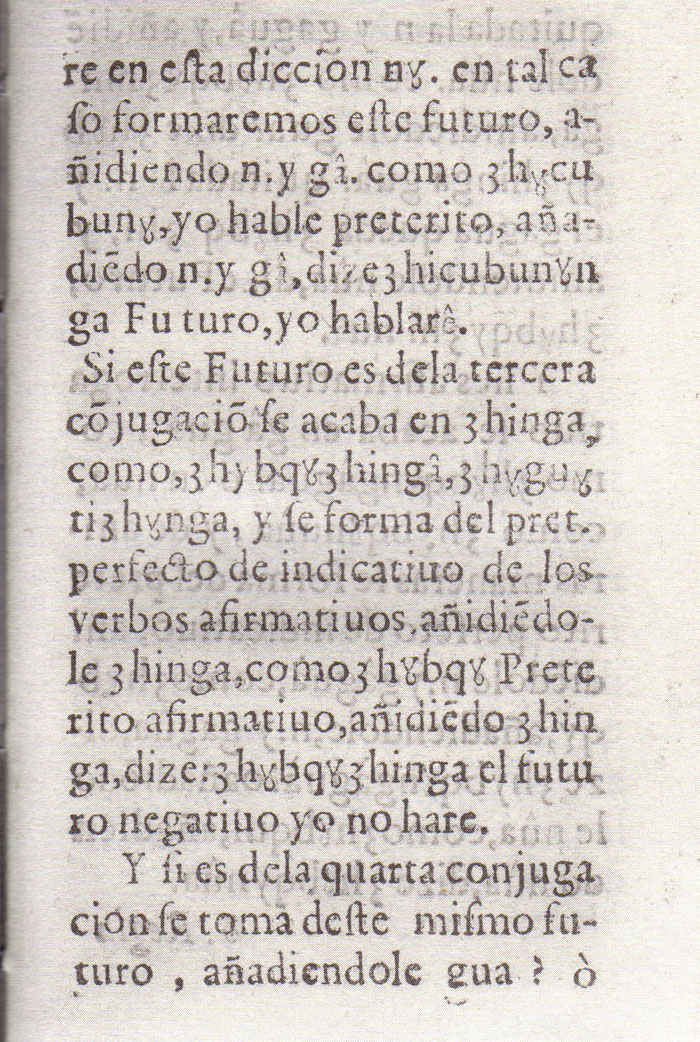m (Plantilla de añadidos) |
|||
| (No se muestran 8 ediciones intermedias de 2 usuarios) | |||
| Línea 1: | Línea 1: | ||
{{trascripcion_lugo | {{trascripcion_lugo | ||
|seccion = | |seccion = | ||
| − | |anterior = | + | |anterior = fol 75v |
| − | |siguiente = | + | |siguiente = fol 76v |
| − | |foto = | + | |foto = Gramatica_Lugo_76r.jpg |
| + | |morfo_d = | ||
| + | |||
| + | {{der|{{an1|76}}}} | ||
| + | re en eſta diccion '''nɣ'''. en tal ca{{an1|-}} <br> | ||
| + | ſo formaremos eſte futuro, a- <br> | ||
| + | ñidiendo '''n'''. y '''gâ'''. como '''[[ʒhɣ-|ʒhɣ]][[cubunsuca|cu''' <br> | ||
| + | '''bunɣ]]''', yo hable preterito, aña- <br> | ||
| + | diẽdo '''n'''. y '''gâ''', dize '''[[ʒhɣ-|ʒhɣ]][[cubunsuca|cubun]][[-nɣnga|{{an|n}}ɣn''' <br> | ||
| + | '''ga]]'''<ref>En el original, "ʒh'''i'''cubunɣn'''//'''ga".</ref> Futuro, yo hablarê.<br> | ||
| + | Si eſte Futuro es dela tercera <br> | ||
| + | cõjugaciõ ſe acaba en '''[[-ʒhi|ʒhi]][[-nga|nga]]''', <br> | ||
| + | como, '''[[ʒhɣ-|ʒhɣ]][[-b|b]][[qɣsquâ|qɣ]][[-ʒhi|ʒhi]][[-ngâ|ngâ]]<ref>En el original, "ʒh'''y'''bqɣʒhingâ".</ref>''', '''{{cam1|[[ʒhɣ-|ʒhɣ]][[-g|g]][[uitɣsûca|uɣ''' <br> | ||
| + | '''ti]][[-ʒhi|ʒhɣ]][[nga|nga]]|ʒhɣguitɣʒhinga}}''', y ſe forma del pret.<br> | ||
| + | perfecto de indicatiuo de los <br> | ||
| + | verbos afirmatiuos, añidiẽdo- <br> | ||
| + | le '''[[-ʒhi|ʒhi]][[-nga|nga]]''', como '''[[ʒhɣ-|ʒhɣ]][[-b|b]][[qɣsquâ|qɣ]]''' Prete{{an1|-}} <br> | ||
| + | rito afirmatiuo, añidiẽdo '''[[-ʒhi|ʒhi]][[-nga|n''' <br> | ||
| + | '''ga]]''', dize: '''[[ʒhɣ-|ʒhɣ]][[-b|b]][[qɣsquâ|qɣ]][[-ʒhi|ʒhi]][[-nga|nga]]''' el futu{{an1|-}} <br> | ||
| + | ro negatiuo yo no hare. <br> | ||
| + | Y ſi es dela quarta conjuga{{an1|-}} <br> | ||
| + | cion ſe toma deſte miſmo fu- <br> | ||
| + | turo, añadiendole '''[[-gua|gua]]?''' ò | ||
| + | |||
| + | |||
| + | |||
| + | |||
|texto = | |texto = | ||
| − | {{der| | + | {{der|{{an1|76}}}} |
| − | re en eſta diccion '''nɣ'''. en tal ca | + | re en eſta diccion '''nɣ'''. en tal ca{{an1|-}} <br> |
ſo formaremos eſte futuro, a- <br> | ſo formaremos eſte futuro, a- <br> | ||
ñidiendo '''n'''. y '''gâ'''. como '''ʒhɣcu''' <br> | ñidiendo '''n'''. y '''gâ'''. como '''ʒhɣcu''' <br> | ||
'''bunɣ''', yo hable preterito, aña- <br> | '''bunɣ''', yo hable preterito, aña- <br> | ||
| − | diẽdo '''n'''. y '''gâ''', dize ''' | + | diẽdo '''n'''. y '''gâ''', dize '''ʒhɣcubunɣn''' <br> |
| − | '''ga'''<ref> | + | '''ga'''<ref>En el original, "ʒh'''i'''cubunɣn'''//'''ga".</ref> Futuro, yo hablarê.<br> |
Si eſte Futuro es dela tercera <br> | Si eſte Futuro es dela tercera <br> | ||
cõjugaciõ ſe acaba en '''ʒhinga''', <br> | cõjugaciõ ſe acaba en '''ʒhinga''', <br> | ||
| − | como, ''' | + | como, '''ʒhɣbqɣʒhingâ<ref>En el original, "ʒh'''y'''bqɣʒhingâ".</ref>''', '''ʒhɣguɣ''' <br> |
| − | '''tiʒhɣnga''', y ſe forma del pret. <br> | + | '''tiʒhɣnga''', y ſe forma del pret.<br> |
perfecto de indicatiuo de los <br> | perfecto de indicatiuo de los <br> | ||
verbos afirmatiuos, añidiẽdo- <br> | verbos afirmatiuos, añidiẽdo- <br> | ||
| − | le '''ʒhinga''', como '''ʒhɣbqɣ''' Prete | + | le '''ʒhinga''', como '''ʒhɣbqɣ''' Prete{{an1|-}} <br> |
rito afirmatiuo, añidiẽdo '''ʒhin''' <br> | rito afirmatiuo, añidiẽdo '''ʒhin''' <br> | ||
| − | '''ga''', dize: '''ʒhɣbqɣʒhinga''' el futu | + | '''ga''', dize: '''ʒhɣbqɣʒhinga''' el futu{{an1|-}} <br> |
ro negatiuo yo no hare. <br> | ro negatiuo yo no hare. <br> | ||
| − | Y ſi es dela quarta conjuga | + | Y ſi es dela quarta conjuga{{an1|-}} <br> |
cion ſe toma deſte miſmo fu- <br> | cion ſe toma deſte miſmo fu- <br> | ||
turo, añadiendole '''gua ?''' ò | turo, añadiendole '''gua ?''' ò | ||
}} | }} | ||
Revisión actual - 10:43 18 mar 2024
re en eſta diccion nɣ. en tal ca[-]
ſo formaremos eſte futuro, a-
ñidiendo n. y gâ. como ʒhɣcu
bunɣ, yo hable preterito, aña-
diẽdo n. y gâ, dize ʒhɣcubunɣn
ga[1] Futuro, yo hablarê.
Si eſte Futuro es dela tercera
cõjugaciõ ſe acaba en ʒhinga,
como, ʒhɣbqɣʒhingâ[2] , ʒhɣguɣ
tiʒhɣnga, y ſe forma del pret.
perfecto de indicatiuo de los
verbos afirmatiuos, añidiẽdo-
le ʒhinga, como ʒhɣbqɣ Prete[-]
rito afirmatiuo, añidiẽdo ʒhin
ga, dize: ʒhɣbqɣʒhinga el futu[-]
ro negatiuo yo no hare.
Y ſi es dela quarta conjuga[-]
cion ſe toma deſte miſmo fu-
re en eſta diccion nɣ. en tal ca[-]
ſo formaremos eſte futuro, a-
ñidiendo n. y gâ. como ʒhɣcu
bunɣ, yo hable preterito, aña-
diẽdo n. y gâ, dize ʒhɣcubun[n]ɣn
ga[4] Futuro, yo hablarê.
Si eſte Futuro es dela tercera
cõjugaciõ ſe acaba en ʒhinga,
como, ʒhɣbqɣʒhingâ[5] , ʒhɣguɣ
tiʒhɣnga[6] , y ſe forma del pret.
perfecto de indicatiuo de los
verbos afirmatiuos, añidiẽdo-
le ʒhinga, como ʒhɣbqɣ Prete[-]
rito afirmatiuo, añidiẽdo ʒhin
ga, dize: ʒhɣbqɣʒhinga el futu[-]
ro negatiuo yo no hare.
Y ſi es dela quarta conjuga[-]
cion ſe toma deſte miſmo fu-

Referencias
- ↑ En el original, "ʒhicubunɣn//ga".
- ↑ En el original, "ʒhybqɣʒhingâ".
- ↑ Lematización morfológica realizada manualmente por Diego F. Gómez, usando como base a Gómez et Al. Transcripción Gramática de Lugo.
- ↑ En el original, "ʒhicubunɣn//ga".
- ↑ En el original, "ʒhybqɣʒhingâ".
- ↑ Creemos que lo correcto debió haber sido ʒhɣguitɣʒhinga.
- ↑ Fotografía tomada de Fray Bernardo de Lugo. Gramatica en la Lengva General del Nvevo Reyno, llamada Mosca. Volumen de la Biblioteca Luis Ángel Arango, volumen del Instituto Caro y Cuervo (Gramática de Pasca), volumen de la Biblioteca Pública de Nueva York y facsímil del volumen de la Universidad del Rosario. Bogotá Colombia. 2004. Digitalizado por Jorge Yopasá Cárdenas.
